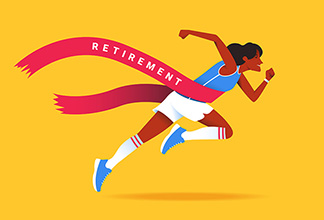Want to Save for a House? Be Frugal, Healthy and Smart in the Kitchen
Written by Trish Snyder
Published on April 8, 2017
minute read
Share:
After graduating from university, I felt like I'd won the lottery. I landed a great job, joined a gym and found the perfect apartment close to friends. But I was failing miserably at one thing: budgeting.
In theory I knew how to manage spending, but in practice I was blowing my food allowance too quickly and often on food that added to my waistline without satisfying my appetite. When my fridge was empty, I routinely stocked it with organic greens, which would only rot as I headed out for pub food with friends.
To top it all off, I was starting to dip into my savings to pay for basic expenses. Ugh!
My new focus became eating well and saving for the perfect house, so I decided to take a page out of my daily, get-serious gym playbook and apply it to my budget.
Paying ME First
Living well now and later can be easy when you Pay Yourself First. Instead of making my savings and investments an afterthought, I arranged to have a slice of every paycheque transferred to my investment account as soon as it was deposited. Don't forget, if you commit to saving a percentage of your pay instead of a specific amount, how much you're setting aside will climb when that raise comes your way.
To help carve out the cash I was putting away, I started looking at supermarket flyers and planning weeknight dinners. When there was a bargain on steak, I made tacos and took the leftovers for lunch. If canned tomatoes were on sale, it was time to stock up and freeze containers of homemade spicy pasta sauce for post-workout meals. Not only was I eating better, but was also socking away a portion of every paycheque into a Tax-Free Savings Account. Anything to get me closer to that house!
"To help carve out the cash I was putting away, I started looking at supermarket flyers and planning weeknight dinners."
Paying myself first meant that, because I didn't see the money sitting there, I didn't get accustomed to spending it — and didn't miss it. It's the same reason I stopped buying those expensive packaged cookies. If they were sitting in the cupboard, it was hard to resist the temptation to eat them.
In no time, my diet and new "financial fitness" felt normal, and really not that painful — which I wish I could say about my gym workouts! Some of my favourite foods, like my dad's famous lentil soup, cost just pennies a bowl. I could eat well, save money and still have a little left to join my friends at the pub for happy hour.
Taking Advantage of Dollar-Cost Averaging
I realized that while flipping through supermarket flyers every week was a great way to eat well on a budget, I needed a different course for my investment plan. Since I didn't have a big chunk of cash to invest all at once, my monthly contributions meant I could put dollar-cost averaging to work for me.
Investing a fixed amount on a regular basis—in my case around $200 per paycheque — meant I didn't have to watch the markets hour by hour to determine when the best time to buy or sell was. Prices were higher in some months and lower in others, but the idea was that my average price would generally end up somewhere in the middle overall.
Just like I stocked my freezer when fresh salmon went on sale, I was building up my savings and making my money work harder so I could shorten the journey to my house. It was like having my fish cakes and eating them too.
Our Pre-Authorized Contributions Calculator and goal-setting tool can help you get started and stay focused on saving for your goal.
RBC Direct Investing Inc. and Royal Bank of Canada are separate corporate entities which are affiliated. RBC Direct Investing Inc. is a wholly owned subsidiary of Royal Bank of Canada and is a Member of the Investment Industry Regulatory Organization of Canada and the Canadian Investor Protection Fund. Royal Bank of Canada and certain of its issuers are related to RBC Direct Investing Inc. RBC Direct Investing Inc. does not provide investment advice or recommendations regarding the purchase or sale of any securities. Investors are responsible for their own investment decisions. RBC Direct Investing is a business name used by RBC Direct Investing Inc. ® / ™ Trademark(s) of Royal Bank of Canada. Used under licence. © Royal Bank of Canada 2017. All rights reserved.
The views and opinions expressed in this publication are for your general interest and do not necessarily reflect the views and opinions of RBC Direct Investing.
Explore More

Should I Invest or Pay Down My Mortgage?
Consider these four questions
minute read

As Many Head Back to the Office, Where Could Investors See Changes?
How returning to in-person work could affect a range of investments
minute read

Considering the FIRE Lifestyle? Here’s What Your Investments Might Look Like
We asked three people how they created financial independence and retired early
minute read
Inspired Investor brings you personal stories, timely information and expert insights to empower your investment decisions. Visit About Us to find out more.







